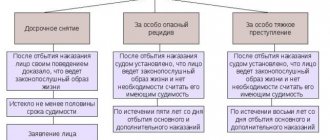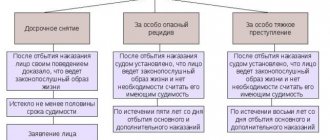Parole from serving a sentence was introduced in France.
This happened in 1885. After this legal institution was adopted by other countries of the world. Parole reflects the humane and fair attitude of the state towards convicts, stimulates the latter to reform, and helps maintain discipline in correctional institutions. In Russian law, parole has a number of special factors. Multi-channel free hotline Legal advice on criminal law. Every day from 9.00 to 21.00
Moscow and region: +7 (495) 662-44-36
St. Petersburg: +7 (812) 449-43-40
Parole under Article 228
The essence of parole is to reward the prisoner for good behavior and compliance with the rules . The possibility of parole gives a citizen an incentive to improve, to prove that he can become a full-fledged, non-dangerous member of society, that he has reformed.
It does not matter under what article the citizen was convicted. Conditional early release is also possible while serving a sentence under Article 228 of the Criminal Code of the Russian Federation. The main thing is that the person proves that he can integrate into ordinary life and does not plan to commit crimes in the future.
It is wrong to ask the question whether it is possible to get out on parole under 228. The point is not in a specific article, but in the fact of correction. But, at the same time, the person is not completely exempt from punishment. The remaining term is replaced by a more lenient measure - a suspended sentence, which is served without imprisonment.
Article 79 of the Criminal Code of the Russian Federation establishes the following features necessary for parole:
- is possible only if complete deprivation of liberty is not required for final correction;
- can only be entered by a court.
The court will take various factors into account. First of all, the fact of compensation for harm. But Article 228, which provides for punishment for the possession or distribution of drugs and other prohibited substances, considers society as a whole to be the victim. Therefore, it is assumed that the damage can be compensated to society. For example, providing assistance to drug addicts.
Each case is considered individually. In one case there may be a specific victim. In others, no. Courts do not always require compensation. Therefore, a complex of circumstances is taken into account, and not each individually.
Clearing a criminal record upon release
First you need to decide what constitutes a criminal record.
This is the position of the subject, generated by the condemnation and imposition of responsibility for an unlawful act, entailing a legal outcome in the next offense. In the case of the last event, the most severe types of punishment are applied to the subject as for acts that are dangerous to society. A criminal record is expunged when:
- Subject is sentenced to prison for minor to moderate offenses upon completion of a three-year post-discharge period.
- The subject is sentenced to imprisonment for aggravated acts - upon completion of an eight-year term after termination of responsibility.
- The subject is sentenced to imprisonment for particularly serious offenses - after 10 years of cessation of responsibility.
As you can see, the nature of the committed act plays an important role for parole.
With parole, the period for expunging a criminal record is calculated based on the actual period of responsibility. The period is counted from the moment of completion of any type of punishment.
It happens that it is possible to have a criminal record expunged ahead of time. This is left to the discretion of the court that receives the offender's request. The main condition will be excellent behavior and compensation for damage.
When a criminal record is expunged or removed, all subsequent legal circumstances are canceled.
Deadline for applying parole under Article 228
In accordance with the current legislation, namely Article 79 of the Criminal Code of the Russian Federation, in order to apply for parole under Article 228, you must serve at least ¾ of the term appointed by the court. But if the punishment was provided for under the first part of the article, the petition can be filed after serving a third of the sentence.
In fact, release after serving ⅓ of the sentence is rare in practice. Judges are more likely to believe that drug trafficking, even on a small scale, causes significant harm to social relations. Therefore, early release of the guilty begins closer to the end of the sentence.
The Supreme Court will recalculate parole
37K 6 4 min.
The Presidium of the Supreme Court will consider the complaint of convicted Ilya Erekhinsky regarding the mechanism of parole. Currently, convicts can apply for parole after serving a certain part of their sentence. But if the court changes imprisonment to forced labor, then the right to parole is “nullified.” According to the applicant, the period required to apply for parole should be counted from the moment of the verdict - and not depend on the commutation of the sentence. This problem may affect up to 190 thousand prisoners, indicate the Sitting Rus' human rights foundation. The foundation’s experts prepared an “amicus curiae” expert opinion on this issue for the Supreme Court: they indicate that “zeroing” sentences is not only illegal, but also hinders the social adaptation of convicts.
Photo: Alexander Koryakov, Kommersant / buy photo
Photo: Alexander Koryakov, Kommersant / buy photo
In November 2021, the Kingisepp City Court sentenced Ilya Erekhinsky to four and a half years in prison for intentionally causing grievous bodily harm resulting in death by negligence (Part 4 of Article 111 of the Criminal Code of the Russian Federation). In 2021, the Tosno City Court replaced this punishment with forced labor - when convicts live and work in special correctional centers. Shortly thereafter, the man applied for parole because he had served the required two-thirds of his sentence. However, the Kolpinsky District Court indicated that now the period required for parole is counted anew - from the first day of forced labor. The judges referred to the resolution of the plenum of the RF Supreme Court No. 8 of 2009.
“The logic of the court put my client in an unequal position with other convicts, for whom the remaining term of imprisonment was not replaced by forced labor. After serving two-thirds of their sentence, they were released,” lawyer Viktor Ermolaev, who represents the interests of Ilya Erekhinsky, told Kommersant. He tried to challenge the decision in higher courts and reached the Criminal Division of the Supreme Court. Mr. Ermolaev insisted that Art. 79 of the Criminal Code of the Russian Federation, which regulates the right to parole, does not contain separate rules on the recalculation of terms when replacing a sentence.
In January 2021, a Supreme Court judge agreed with the lawyer's arguments and redirected the case to the Third Court of Cassation of General Jurisdiction. There, the decisions of the district and city courts were declared illegal; the case was sent back to the Kolpinsky District Court. After this, the Prosecutor General's Office appealed to the Supreme Court. The department stated that when replacing, a new punishment is actually assigned - which means that the term should not remain the same. “If during the replacement a new punishment is imposed, then it turns out that the court’s decision in accordance with Art. 80 of the Criminal Code of the Russian Federation can replace a sentence. This is fundamentally wrong and contradicts the Criminal Code,” Viktor Ermolaev is sure.
Nevertheless, the Supreme Court sided with the Prosecutor General’s Office and recognized the legality of “resetting” the parole period.
Supreme Court Judge Viktor Smirnov, who participated in the consideration of the appeal, did not agree with his colleagues. In his dissenting opinion, he supported the lawyer’s arguments: “Unlike release from punishment, when replacing the unserved part of the punishment with a more lenient punishment, the execution of the court sentence does not stop. Consequently, the passage of time does not stop in this case.” Judges of the Supreme Court “extremely rarely” express a dissenting opinion in the criminal sphere, explained Viktor Ermolaev. He suggested that Viktor Smirnov expressed it because of “obvious inaccuracies” in the reasoning of his fellow judges.
According to the lawyer, the case of Ilya Erekhinsky “attracted the attention of a significant number of convicts” serving forced labor. And the Supreme Court decision led to denials of parole for other prisoners. This prompted the lawyer to file a supervisory complaint, although Ilya Erekhinsky had already exercised his right to a “nullified” parole during the proceedings. Now the Presidium of the Supreme Court will consider the issue of terms of parole.
“The case of Ilya Erekhinsky is the first of its kind to reach the Supreme Court. However, convicts in different regions are already facing the problem of calculating parole terms. Therefore, it is very important that the court finally resolves the legal dispute,” Olga Podoplelova, a lawyer at the Sitting Rus' Foundation for Assistance to Convicts and Their Families, told Kommersant.
Currently, there are 17 correctional centers and 70 isolated areas in Russia, where there are 5,437 people sentenced to forced labor, she recalled. But according to statistics from the Federal Penitentiary Service, about 190 thousand prisoners have grounds to apply for transfer to forced labor.
In early September, Sitting Rus' sent an independent expert opinion “amicus curiae” (Latin for “friend of the court”) to the Presidium of the Supreme Court. Such a document is the first in the fund’s practice. “Such participation always presupposes that there is an important legal problem in the case, and the decision on it will form a certain practice, and therefore it is necessary to take into account many factors and arguments,” explained Ms. Podoplelova. “We provided additional information that the parties did not previously rely on in their positions." The authors of the report analyzed UN documents, decisions of the ECHR and recommendations of the Committee of Ministers of the Council of Europe. The foundation's experts came to the conclusion that the annulment of terms for parole does not comply with international and constitutional requirements. They also found at least two arguments against it. Firstly, the replacement of the unserved part of the sentence cannot be considered a mitigation of the sentence. “Forced labor is a form of deprivation of liberty and is associated with significant social restrictions,” the document notes. Secondly, the period must be clearly regulated by law - and cannot be so long as to devalue the use of parole. “The actual period of imprisonment should be minimized due to the increasing negative consequences of social isolation, and the question of parole should be raised as early as possible,” noted Ms. Podoplelova. Human rights activists emphasize that forced labor was introduced into Russian legislation precisely for the “planned and controlled integration of convicts into society” and difficulties with the right to parole can negate the positive effect.
The date of the meeting of the Supreme Court Presidium will be known within two months.
Elizaveta Lamova
How to obtain parole under Article 228 of the Criminal Code of the Russian Federation
Parole for possession and distribution of drugs is possible only if the convicted person correctly builds a model of his behavior. To get a chance to be released before the end of the sentence, you need to prove to the court that the offender has ceased to be socially dangerous.
To do this you need to meet the following requirements:
- Good behavior. The convicted person should not have any comments, should not be seen in violation of order, etc. At the same time, the Supreme Court found that the main importance should not be given to the presence of penalties and incentives. But in practice they are still regarded as fundamental factors.
- Work. Those convicts who do not work in prisons cannot be released early.
- Social activity. Participation in a musical group or sporting event is also important. In this way, the prisoner shows that he can be part of a team and, accordingly, reintegrate into society.
- Working with a narcologist. If a citizen was also found in a state of drug intoxication, he needs to prove that he has gotten rid of his addiction and will be able to lead his life in freedom without using drugs.
- Working with a psychologist. Receiving a good reference from him may be a reason for approval of early release.
The court will not focus only on one point. He will look at the situation as a whole. And even if certain conditions are not met, this does not mean that parole is impossible.
Article 228 of the Criminal Code of the Russian Federation is complicated by the fact that parole under it is not often approved. There are not many positive practices. This does not mean that the convicted person will not be able to leave earlier. This means that he needs to try and really convince the judges that he can become a full and useful member of society.
When a parole order can be revoked
The legislation establishes certain requirements for a person released after release on parole; violation of these requirements may lead to the cancellation of the court order, and, consequently, to the resumption of the sentence of imprisonment until the end of the entire term. In addition, if the released person commits a new crime while on parole, the term of the new sentence will be increased - the parole will be canceled and a new term will be added to it for the new offense.
Important! If the new crime was committed due to negligence, the court has the right to decide whether there is a need to revoke parole or whether it is possible to get by with a more lenient punishment provided for by law.
Violation of the requirements of parole may also include malicious failure to comply with the conditions of release, atrocities entailing administrative liability - petty hooliganism, drinking alcohol, fights, etc., as well as lack of response to the comments of the supervising inspector.
Stages of parole for drugs
The prisoner must be eligible for parole immediately after his arrest. At the moment when he realizes that punishment cannot be avoided, he must build an action plan on how to get out earlier.
The accused is recommended to immediately record all points that may become a reason for parole. For example, checks proving compensation for damage, actions aimed at reconciliation, etc. This is the only way to increase your chances of leaving earlier.
While already in the colony, you need to continue recording all the factors that contribute to parole. It is necessary to preserve evidence, and, if possible, transfer it to a lawyer or trusted persons for safekeeping.
In order for the court to approve release on parole, you need to get a good reference from the head of the colony. Here a lot depends on the personality of the boss. The chance of early release will largely depend on how he treats a particular prisoner.
It is also recommended to contact the administrative commission. This body will decide whether to support the prisoner and whether to advocate for the early release of the culprit. You need to understand that the fact that the colony leadership supports it does not mean that the court will support the petition. But it will increase the chance of a positive outcome.
Next, you need to file a petition for parole. This can be done by a lawyer or the prisoner himself. You should not listen to others; it is recommended to write on your own, indicating all the factors that indicate the possibility of parole. It is necessary to convince the court that release is possible, that it will not harm public interests, that the culprit has realized his behavior and has corrected himself.
In addition to your application, you may receive letters of recommendation. They can be issued by anyone, from relatives and friends to prison staff. You can also receive a letter from a potential employer expressing their intentions for employment.
Rules for drawing up an application for parole in 2018
So, your application for parole must contain the following information:
- Full name, address and details of the court where the application will be considered;
- Information about the prisoner: full name in the nominative case;
- Place of serving the sentence;
- Term of imprisonment.
How to submit a petition
The petition is submitted through the head of the colony . This can be done in person or through a lawyer. Some people advise against a government lawyer who represents you for free. But the decision must be made calmly, weighing the pros and cons. If it is possible to hire an outside defender, it is better to find an experienced professional whose help will increase the chances of success.
Filing an application yourself is also a good option. The prisoner will be able to identify factors about himself that the defense may not be aware of. The culprit will better convey his inner feelings and attitude towards the crime.
Why refuse an appointed lawyer?
Pro bono lawyers have a reputation for not being serious about their work. They do it only because they have to. Therefore, the result is appropriate.
That is why, if possible, it is better to refuse their services and hire specialists separately . But not everyone has this opportunity, since services can be expensive.
You can also file an application for parole on your own. If the prisoner is literate and knows how to express his thoughts on paper, then he will cope with this task.
To apply for parole you need to wait for graduation
Misconception:
You cannot apply for parole from a pre-trial detention center - you must wait until the end and go to the zone.
In fact:
According to the law, if the verdict is not appealed by the parties, it enters into legal force 10 days after its announcement, and for those deprived of liberty - after they become familiar with it. What is legal? A law is a notice of the entry into force of a sentence. With this piece of paper, the court informs the administration of the detention center that the convicted person can be sent to the place of serving his sentence.
There are often cases when convicts wait for several months (sometimes longer). At the same time, the law does not require the law to come to the pre-trial detention center and does not prohibit filing a petition from the detention center. If a person has filed a petition. And he, for example, was taken to the stage - the court itself will send documents according to jurisdiction.
To be honest, the courts usually consider petitions filed from pre-trial detention centers to be somewhat premature - the percentage of refusals is off the charts. But it’s worth a try - especially if you are confident in your correction. Often, refusals on such grounds can be easily challenged in the appellate court as illegal and unfair.
Why is it worth applying for parole through a colony?
The petition can be submitted in two ways:
Through a lawyer;
Through the colony.
It is better to choose the second one if normal contact has been established with management. Especially if the boss and other employees are ready to give positive references.
In any case, with parole you need to focus on the Criminal Code. Article 228 is no exception. You also need to focus on procedural and penal regulations, as well as practice.
It is better to submit a petition through the colony when a free lawyer is not ready to work. If it is immediately obvious that he is doing everything “for show,” it is better to refuse his services. If there is no money for a paid specialist, the application is submitted through the colony.
Is it possible to get parole again?
When, while on parole, a person released has committed an administrative act, maliciously fails to comply with the requirements of the court, committed a careless act or an offense of minor or moderate gravity, you can count on parole.
In this situation, one must also keep in mind that the subject must actually fulfill two-thirds of the sentence.
A previously revoked release is not a reason to deny another parole. During legal proceedings, it is necessary to take into account all the facts: exclusion of the previous parole, time of imprisonment in a correctional organization, compliance with discipline, position regarding the labor and educational sphere, and the like.
The norm regarding parole of the current Criminal Code of the Russian Federation changed insignificantly during 2015–2018.
In 2021, an amendment was introduced to paragraph “d” of Part 3, namely, Art. 361 on the mandatory execution of 3/4 of the conclusion for parole.
Other changes to the article were made at an earlier period.






